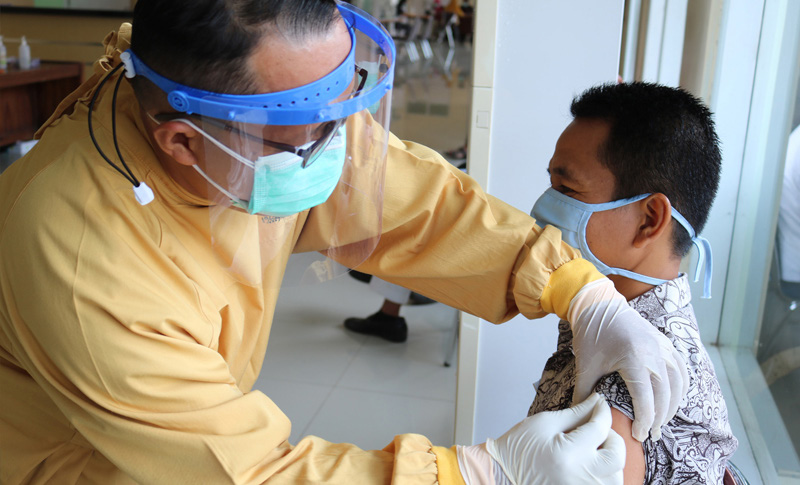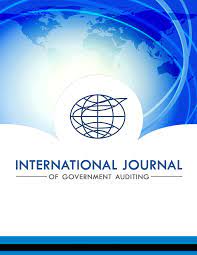About IDI
Our Cross-Cutting Priorities
Our Results
Meet the IDI Board
IDI's Board is composed of ten members from different supreme audit institutions. Get to know them better in our "Meet the Board" series.
by Martin Aldcroft, Senior Manager, IDI Strategic Support Unit

As an international lender of last resort, the International Monetary Fund (IMF) has been the largest provider of emergency financing for COVID-19, making available an unprecedented $250 billion to over 85 member countries. These funds, which have largely been used as domestic budget support, have been critical in bolstering governments’ responses to the pandemic.
However, the rapid dispersal of these vast sums has increased the risk of ineffective or improper use. Emergency measures, such as streamlined procurement of medical equipment and vaccines, have weakened the public finance systems of recipient countries. Further, the IMF has provided these funds in full and up front, without some of the organization’s normal control mechanisms.
Recognizing these risks, the IMF has encouraged countries to “Do whatever it takes, but keep the receipts”—i.e., to act promptly, while also increasing efforts to ensure transparency and accountability of public spending. Supreme Audit Institutions (SAIs) have the mandate, capacity, and experience to play a critical role in this endeavor. However, for most effective oversight of the use of emergency funding, greater understanding, dialogue, and cooperation are needed between the IMF and SAIs.
This article summarizes some of the key messages from a paper the INTOSAI Development Initiative (IDI) recently published on strengthening the role of SAIs in auditing IMF emergency financing. While the paper focuses on the relationship between SAIs and the IMF, many of its concepts equally apply to emergency funding from other partners that is channeled through national systems.
Importance of Including SAIs in Discussions about Conditions of Emergency Support
During the pandemic, SAIs have applied a variety of tools to enhance the transparency and accountability of the use of emergency financing. Many SAIs have used real-time audits—focused compliance audits with short timeframes and streamlined processes—to examine high-risk areas and report rapidly. Other SAIs have audited the use of emergency funding as part of their annual financial audits of the state budget. SAIs have also carried out performance audits, such as on the institutional framework for receiving, distributing, and using donated pandemic supplies.
However, SAIs should not only apply ex-post controls, but also be invited to and play an active part in discussions with the IMF and other donor organizations about the audit commitments attached to support before the funds are dispersed.
To address vulnerabilities to fraud and corruption associated with emergency funding, the IMF includes specific safeguards— commitments from recipient countries to take certain actions— in the Letters of Intent (LOI) attached to funding agreements. Such commitments vary widely but often stipulate that the country’s SAI audit the use of emergency funding.
To reach an agreement on these commitments, the IMF usually works with the recipient country’s Finance Ministers and Central Bank Governors. However, this convention poses a risk to SAI independence and prevents SAIs from providing key input into the dialogue.
While SAI independence has many dimensions, Principle 3 of the Mexico Declaration is especially pertinent to the audit of emergency funding, as SAIs are to be free from direction or interference from the legislature or the executive in the selection of audit issues. Fortunately, it appears that while SAIs have largely been left out of discussions on audit commitments in LOIs, in practice they have enjoyed the necessary freedom to interpret how those commitments are to be applied. An IDI survey examining the impact of the pandemic on SAI independence found that 94 percent of responding SAIs were free to decide on their audits, including of COVID-19 emergency spending.
Involving SAIs in the dialogue about audit commitments not only respects and safeguards SAI independence. It also offers the opportunity for SAIs to provide critical information about factors that impact whether and how they can audit the use of emergency funds, such as how such funds are channeled, accounted for, and reported in the country’s public financial management system. This input can help determine the audit type and subject matter, audited entities, and audit timeframes called for by the commitments.
By engaging with a wider group of stakeholders, the IMF may have to deal with differences of opinion and challenging relationships between SAIs and the executive. However, the outcome of these discussions could be a set of commitments more closely tailored to the country’s context and more carefully crafted to ensure transparency and accountability.
Taking Challenges into Account in Audit Commitments
Another key factor that the IMF and SAIs should discuss is the ability of SAIs to implement the audit commitments in LOIs. Agreements that the SAI factor audits of the use of emergency funding into its audit plans may be futile unless the SAI has the appropriate independence and legal mandate; access to the necessary documents; sufficient resources; and the right to publish its findings in a timely manner. Commitments for auditing emergency funds may need to be accompanied by other measures that address these issues.
Sometimes the challenges may extend beyond the SAI’s ability to audit the use of emergency funding, to questions over the functionality or impact of the SAI. Key principles for engagement in these circumstances include:
Policy Proposals for SAIs and the IMF
The COVID-19 pandemic has underscored that SAIs and the IMF are natural partners with shared objectives, such as:
Closer engagement would help the IMF and SAIs advance these objectives, as well as enhance their relationships with their respective stakeholders. To that end, the IMF, its member countries, and SAIs should consider the following measures, as relevant for each country:
SAIs and the IMF. Establish a dialogue to gain a deeper understanding of each other’s roles, identify shared objectives, and determine how to address the challenges SAIs face in delivering on their audit mandate.
SAIs. Review, and if necessary, update their annual audit plans to reflect emerging risks and changing stakeholder expectations due to the pandemic, recognizing the IMF as a stakeholder with shared objectives.
The IMF. Recognize that SAIs are the primary bodies responsible for auditing the use of emergency funds. Ensure, where possible, that audit commitments are developed through dialogue with the SAI; respect SAI independence; reflect country circumstances; and include actions necessary to enable SAIs to deliver on audit commitments. Integrate the role of SAIs into its country-level monitoring work.
IMF Members. Respect SAI independence when discussing and agreeing upon SAI-related commitments in funding agreements.
 |
To read more, click here. |